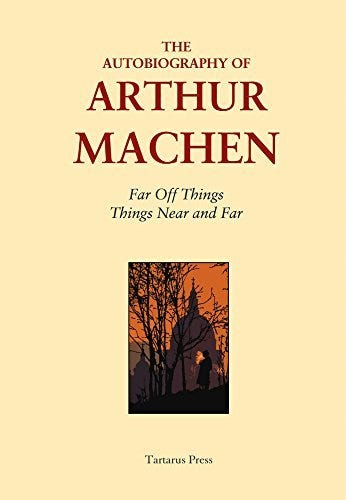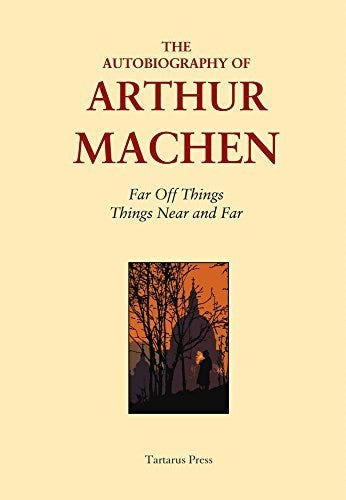The most "magical"1 reading experience of my life took place in my 51st year, when I finally picked up a book of stories by Arthur Machen and started reading. The below excerpt from Machen's memoirs will indicate just a little bit of what attracted me. It describes some of his experiences soon after death of first wife, circa 1900:
....So, again, I distrust the senses, and though I wondered and still wonder, I make nothing much of the great gusts of incense that were blown in those days into my nostrils, of the odours of rare gums that seemed to fume before invisible altars in Holborn, in Claremont Square, in grey streets of Clerkenwell, of the savours of the sanctuary that were perceived by me in all manner of grim London wastes and wanderings. One would like to think of the Knights of the Grail who were ware of the ‘odour of all the rarest spiceries in the world’ before the Vision was given to them: but . . . if one is not a Knight of the Grail, but far otherwise?
Then, again, there was that morning, a bright, keen morning of November it seems in my recollection, when I was walking up Rosebery Avenue with a friend, and suddenly became aware of a strange sensation, and as suddenly recollected the old proverb: ‘walking on air’. I remember thinking at the time: ‘this is incredible’; and yet it was a fact. The pavement of that horrible street had suddenly become, not air, certainly, but resilient; the impact of my feet upon it was buoyant; the sensation was delicious. I may mention that that very morning I had made a certain interior resolution; but I do not venture for one moment to connect this with that; I only tell what happened to me. I make no deductions, nor do I venture to conclude anything: remembering always that neither seeing nor smelling nor feeling is necessarily believing. But so it was, exactly as I have told it.
And then there was one afternoon in my sitting-room at 4 Verulam Buildings, Gray’s Inn. I was sitting in my chair, and the wall trembled and the pictures on the wall shook and shivered before my eyes, as if a sudden wind had blown into the room. Let me hasten to say that there was no wind, no actual wind, that is; and that I knew at the time that there was no wind, and was, in consequence, not a little alarmed, not knowing what would happen next. And I must already correct my phrase: I have said that the pictures on the wall opposite to the window that looked on the garden of the Inn ‘shook and shivered’. It is not quite just: trembled, dilated, became misty in their outlines; seemed on the point of disappearing altogether, and then shuddered and contracted back again into their proper form and solidity: that is the closest description of what I witnessed: with a shaking heart, and with a sense that something, I knew not what, was also being shaken to its foundations. This is all wonderful? I suppose that it is; but let me here say firmly that I consider an act of kindness to a wretched mangy kitten to be much more important.
But now comes a puzzle. We are highly composite beings. We all know that a stomach-ache may make a man very miserable, and I believe that science is beginning to admit that misery may give a man a very bad stomach-ache. There are old phrases about a ‘sinking heart’, and a man’s heart being ‘in his boots’. Well, it seems that the heart does not sink, but that the stomach does, when subjected to certain emotional perturbations. Only this morning I was reading in the paper of new radiographic experiments which showed that under certain stimulations of horror or fear or grief the stomach sometimes falls from one to three inches, and the doctor who was conducting the experiments declared that there was the brighter side; that he had mentioned possible ‘pints of bitter’ to some of his subjects, with the result that there was a perceptible and upward movement of the organ in question. And so the play goes round in a ring, with a constant action and reaction of the physical and mental—or psychical, or spiritual —and it will often be difficult to say where the prime cause resides: in the stomach, in the brain, or in the immortal spirit. I have already professed my belief that the true wonder, the true miracle are of the spirit, not of the body; I here confess that in certain cases I find it difficult to disentangle the two worlds of our apprehension, that is to say definitely that the sensible thing, the phenomenal thing, is always and invariably without any true significance.
And so with that afternoon’s work in Gray’s Inn. The shivering pictures that seemed on the point to dissolve and return into chaos, the sensible thrill of delight that accompanied this strange manifestation—I had forgotten that part of the experience—such phenomena as these may be producible, for all I know, by drugs. You can, at all events, see far more wonderful things than anything that I saw by taking a sufficient dose of Anhelonium Lewinii [2] and then shutting your eyes. But . . .
I had better begin at the beginning. That afternoon I was in a state of very dreadful misery and desolation and dereliction of soul. It is strange, but the most dreadful pangs of grief are generally, I think, bearable in the moment of their impact. With the wounds of the spirit, it is as with the wounds of the body; a certain anæsthesia accompanies the actual fall of the blow. I once fell backwards from some little height, and my skull lighting on the edge of a brick, I remained unconscious for more than half an hour. And I remember distinctly that the sensation at the very moment of the crash was that of being lifted and gently laid on the softest of all downy pillows; it was only when I raised myself slowly, not in the least aware that I had been unconscious, that I felt the pain of the great bleeding wound at the back of my head, and a dismal, heavy throbbing of the brow. So with the wounds of the soul; I had borne what had to be borne with some measure of solidity and stolidity; the torture of six years of lamentable expectation had, as I supposed, seared and burned my spirit into dull, insensitive acquiescence: but I was mistaken. A horror of soul that cannot be uttered descended upon me, on that dim, far-off afternoon in Gray’s Inn; I was beside myself with dismay and torment; I could not endure my own being. And then a process suggested itself to me, as having the possibility of relief, and without crediting what I had heard of this process or indeed having any precise knowledge of it or of its results, I did what had to be done—I hasten to add without any more exalted motives than those which urge a man with a raging toothache to get laudanum and take it with all convenient speed. I suffered from a more raging pain than that of any toothache, and I wanted that pain to be dulled; that was all.
From: The Autobiography of Arthur Machen, published by Tartarus Press.
Jay
25 May 2023
[1] "Magical" on second thought sounds too shopworn today. A better, more accurate description would be sublime, ie "on the heights." Machen's own term ecstasy is discussed by the Weird Studies podcasters here.




